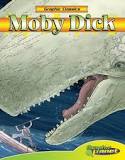Moby-Dick Page #9
Moby-Dick; or, The Whale is an 1851 novel by American writer Herman Melville. The book is sailor Ishmael's narrative of the obsessive quest of Ahab, captain of the whaling ship Pequod, for revenge on Moby Dick, the white whale that on the ship's previous voyage bit off Ahab's leg at the knee.
He commenced dressing at top by donning his beaver hat, a very tall one, by the by, and then—still minus his trowsers—he hunted up his boots. What under the heavens he did it for, I cannot tell, but his next movement was to crush himself—boots in hand, and hat on—under the bed; when, from sundry violent gaspings and strainings, I inferred he was hard at work booting himself; though by no law of propriety that I ever heard of, is any man required to be private when putting on his boots. But Queequeg, do you see, was a creature in the transition stage—neither caterpillar nor butterfly. He was just enough civilized to show off his outlandishness in the strangest possible manners. His education was not yet completed. He was an undergraduate. If he had not been a small degree civilized, he very probably would not have troubled himself with boots at all; but then, if he had not been still a savage, he never would have dreamt of getting under the bed to put them on. At last, he emerged with his hat very much dented and crushed down over his eyes, and began creaking and limping about the room, as if, not being much accustomed to boots, his pair of damp, wrinkled cowhide ones—probably not made to order either—rather pinched and tormented him at the first go off of a bitter cold morning. Seeing, now, that there were no curtains to the window, and that the street being very narrow, the house opposite commanded a plain view into the room, and observing more and more the indecorous figure that Queequeg made, staving about with little else but his hat and boots on; I begged him as well as I could, to accelerate his toilet somewhat, and particularly to get into his pantaloons as soon as possible. He complied, and then proceeded to wash himself. At that time in the morning any Christian would have washed his face; but Queequeg, to my amazement, contented himself with restricting his ablutions to his chest, arms, and hands. He then donned his waistcoat, and taking up a piece of hard soap on the wash-stand centre table, dipped it into water and commenced lathering his face. I was watching to see where he kept his razor, when lo and behold, he takes the harpoon from the bed corner, slips out the long wooden stock, unsheathes the head, whets it a little on his boot, and striding up to the bit of mirror against the wall, begins a vigorous scraping, or rather harpooning of his cheeks. Thinks I, Queequeg, this is using Rogers's best cutlery with a vengeance. Afterwards I wondered the less at this operation when I came to know of what fine steel the head of a harpoon is made, and how exceedingly sharp the long straight edges are always kept. The rest of his toilet was soon achieved, and he proudly marched out of the room, wrapped up in his great pilot monkey jacket, and sporting his harpoon like a marshal's baton. CHAPTER 5. Breakfast. I quickly followed suit, and descending into the bar-room accosted the grinning landlord very pleasantly. I cherished no malice towards him, though he had been skylarking with me not a little in the matter of my bedfellow. However, a good laugh is a mighty good thing, and rather too scarce a good thing; the more's the pity. So, if any one man, in his own proper person, afford stuff for a good joke to anybody, let him not be backward, but let him cheerfully allow himself to spend and be spent in that way. And the man that has anything bountifully laughable about him, be sure there is more in that man than you perhaps think for. The bar-room was now full of the boarders who had been dropping in the night previous, and whom I had not as yet had a good look at. They were nearly all whalemen; chief mates, and second mates, and third mates, and sea carpenters, and sea coopers, and sea blacksmiths, and harpooneers, and ship keepers; a brown and brawny company, with bosky beards; an unshorn, shaggy set, all wearing monkey jackets for morning gowns. You could pretty plainly tell how long each one had been ashore. This young fellow's healthy cheek is like a sun-toasted pear in hue, and would seem to smell almost as musky; he cannot have been three days landed from his Indian voyage. That man next him looks a few shades lighter; you might say a touch of satin wood is in him. In the complexion of a third still lingers a tropic tawn, but slightly bleached withal; he doubtless has tarried whole weeks ashore. But who could show a cheek like Queequeg? which, barred with various tints, seemed like the Andes' western slope, to show forth in one array, contrasting climates, zone by zone.
Translation
Translate and read this book in other languages:
Select another language:
- - Select -
- 简体中文 (Chinese - Simplified)
- 繁體中文 (Chinese - Traditional)
- Español (Spanish)
- Esperanto (Esperanto)
- 日本語 (Japanese)
- Português (Portuguese)
- Deutsch (German)
- العربية (Arabic)
- Français (French)
- Русский (Russian)
- ಕನ್ನಡ (Kannada)
- 한국어 (Korean)
- עברית (Hebrew)
- Gaeilge (Irish)
- Українська (Ukrainian)
- اردو (Urdu)
- Magyar (Hungarian)
- मानक हिन्दी (Hindi)
- Indonesia (Indonesian)
- Italiano (Italian)
- தமிழ் (Tamil)
- Türkçe (Turkish)
- తెలుగు (Telugu)
- ภาษาไทย (Thai)
- Tiếng Việt (Vietnamese)
- Čeština (Czech)
- Polski (Polish)
- Bahasa Indonesia (Indonesian)
- Românește (Romanian)
- Nederlands (Dutch)
- Ελληνικά (Greek)
- Latinum (Latin)
- Svenska (Swedish)
- Dansk (Danish)
- Suomi (Finnish)
- فارسی (Persian)
- ייִדיש (Yiddish)
- հայերեն (Armenian)
- Norsk (Norwegian)
- English (English)
Citation
Use the citation below to add this book to your bibliography:
Style:MLAChicagoAPA
"Moby-Dick Books." Literature.com. STANDS4 LLC, 2024. Web. 23 Dec. 2024. <https://www.literature.com/book/moby-dick_18>.




Discuss this Moby-Dick book with the community:
Report Comment
We're doing our best to make sure our content is useful, accurate and safe.
If by any chance you spot an inappropriate comment while navigating through our website please use this form to let us know, and we'll take care of it shortly.
Attachment
You need to be logged in to favorite.
Log In